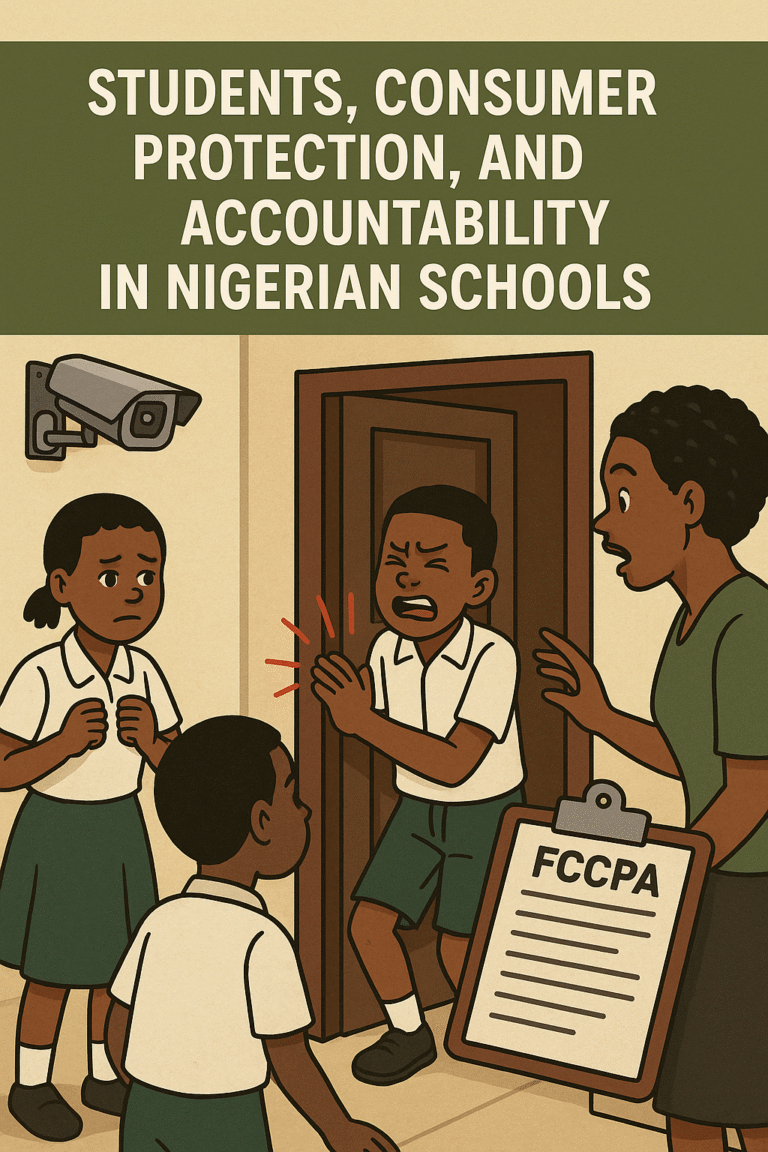Students’ rights, consumer protection, and accountability are trends in Nigeria’s public and private schools. Imagine a pupil’s finger trapped in a classroom door, causing immediate pain and swelling—no sickbay visits. The CCTV footage revealed that no adult offered comfort, and no classmates were encouraged to show empathy. Even worse, the school fails to inform the parents.
Such violations of students’ rights are not just a failure of students’ wellness. It violates Nigeria’s consumer protection law, which applies to educational services. Many educators, operators, parents, and students believe that education is beyond the reach of consumer rights. However, under Nigeria’s Federal Competition and Consumer Protection Act (FCCPA) 2018, learners and their families are protected as consumers of educational services.
What Does the FCCPA Have to Do with Education?
The FCCPA is not only about shopping in markets or buying electronics. It applies to any commercial service, including private schools, tutorial centres, examination training centres, and non-profit education providers.
Whether your child attends a crèche, a secondary school, a remedial college, or a tertiary school, the FCCPA demands fair treatment, safety, transparency, right to information, and redress.
In this commentary, our education lawyers explored how these legal protections apply to real situations in the Nigerian education sector.
- Right to Safe, Quality Services
Under the FCCPA, students and participants in learning programmes have the right to safe, good-quality services. The FCCPA require service providers to prevent harm to users.
In the case of the injured pupil above, the school had a legal duty to:
- Provide a safe learning environment.
- Offer immediate care for injuries, such as a visit to the sickbay.
- Alert the parents or guardians immediately.
Failure to act promptly qualifies as negligent provision of service. Such negligent misconducts amount to a breach of implied safety obligations with heavy legal or regulatory sanctions.
- Right to Information in Plain Language
Many schools fail to inform parents of essential incidents or hide behind vague or misleading excuses.
Vague or misleading information contradicts the FCCPA principles of accessible and prompt information concerning educational services rendered.
The FCCPA states that Nigerian schools provide students, parents, and guardians with clear and understandable information about educational services.
When a child is injured, the school must provide:
- A clear report of what happened.
- Medical attention received (or not received).
- What actions were taken by the school?
Withholding such information is not only unethical, but it is also illegal under the FCCPA and the typical law duties of care and fiduciary.
- Right to Fair Dealing
Imagine paying for school excursions, uniforms, or computer lessons. But your child never receives them, or the service is far below standard. The FCCPA prohibits unfair, misleading, or deceptive conduct.
For example:
- A school that advertises CCTV supervision but cannot retrieve footage when needed may be liable for misrepresentation.
- A school that forces parents to buy textbooks at inflated prices from the school’s store may be engaging in anti-competitive behaviour.
- Employees teachers who are not unaccredited by TRCN (Teacher’s Registration Council of Nigeria) violate the right to fair dealing.
The law protects consumers from such tactics, including in education.
- Right to Dignity and Emotional Safety
Consumer protection is not only about physical goods and services. It also covers the emotional and psychological experience attached to educational services.
In the incident involving the injured pupil, the failure of the school to:
- Offer comfort,
- Encourage empathy among classmates,
- Train teachers to respond humanely,
Showed a deficiency in service delivery. A school is not just an academic space; it is a social environment that must uphold care, dignity, and responsiveness.
The FCCPA empowers the Federal Competition and Consumer Protection Commission (FCCPC) to investigate such failures and, where necessary, sanction the school.
- Right to Redress
Parents and students can file complaints, request refunds, or seek compensation when harmed by a school’s action or inaction. Section 149 of the FCCPA guarantees access to civil remedies, including complaints to the Commission, use of legal action, and even media-supported civil society petitions.
If a pupil is physically injured or emotionally distressed due to a school’s negligence, the family can:
- File a formal complaint with the FCCPC.
- Request that the school issue a public apology.
- Claim compensation for medical bills or emotional harm.
- Demand changes in school policy, e.g., first-aid training and reporting protocols.
In such circumstances, an education lawyer will help your family navigate their legal pathways while offering considerable emotional support.
- Schools Must Be Accountable
The FCCPA schools and school owners are personally liable for persistent violations. If a school principal or board fails to uphold consumer rights, they may face:
- Fines up to ₦50 million for institutions.
- Up to 3 years imprisonment or personal fines for responsible persons.
- Public listing as a violator of consumer rights.
Schools should treat this law not as a threat but as a guidepost for professionalism, safety, and trust.
Conclusion
Whether you are a parent, a student in a tutorial centre, or an undergraduate in a private or public university, the FCCPA protects your rights.
You can act if your school breaks a promise, fails to provide agreed services, puts you in harm’s way, or silences your complaints.
No school is above the law. And no Nigerian student should feel invisible.
Additional resources for Complaints or Help: Visit FCCPC, email contact@fccpc.gov.ng or call 08056002020.
SRJ Legal is the first bespoke education law firm. We complement our education law practice with fintech and commercial dispute (litigation). At the same time, we provide corporate counsel services to businesses and individuals, including families

